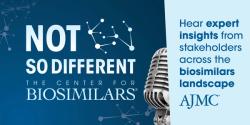© 2026 MJH Life Sciences™ and The Center for Biosimilars - Biosimilars, Health Economics & Insights. All rights reserved.
Julie Maréchal-Jamil: Biosimilar Education in Europe
Julie Maréchal-Jamil, director of biosimilars policy and science at Medicines for Europe, describes current educational needs around biosimilars.
Transcript
In the EU, we've been on the educational journey for now 13 years, and if we look at the situation, we have a pretty rich base of documentation, communication materials. What I think has been a game-changer in the educational aspect is when the government institutions, authorities have stepped in and realized that they needed to tailor information.
We started with a general document in 2013 which was developed in a multistakeholder fashion. Then we also collectively looked at having dedicated patient materials and the healthcare professional [European Medicines Agency, EMA] document last year.
All of that together, we are answering the availability of documentation, the legitimacy of the source, which is extremely important. We’ve also tackled the suitability of the language used, the level for the user.
What remains to be done, you may have seen in the last days, is maybe there's still a different level of understanding between the European levels, be it organizations like patient groups, industrial groups, and maybe what happens at the national level. Another barrier is the language, not in terms of suitability, but in terms of simply English, Spanish, Romanian, or other languages, which actually can be a very important hurdle for local acceptance and growth in confidence.
So in terms of education, I think there's still a lot going on, but it will be more in the dissemination and into empowering local actors.



